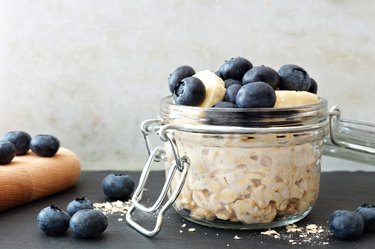
If you love a bowl of oatmeal or oat milk and you have thyroid problems, you may wonder if oats are in any way a thyroid-healing food. According to experts, while there's no specific food shown to have a healing effect on thyroid conditions, oats are fair game, and they may even have some benefit.
Read more: Eating Healthy with Thyroid Disease
Video of the Day
Video of the Day
What Is Thyroid Disease?
According to the American Thyroid Association (ATA), when things go wrong with your thyroid gland, your thyroid hormone production gets out of whack. That's a problem, according to the U.S. National Library of Medicine, because thyroid hormones are critical to your breathing, digestion, heart rate, weight and mood.
Common thyroid diseases include hypothyroidism (an underactive thyroid, most commonly brought on by the autoimmune disorder Hashimoto's thyroiditis in the United States) and hyperthyroidism (an overactive thyroid or excessive hormone production), according to the ATA.
Oats and Thyroid Health
As to whether oats are good or bad for you if you have thyroid problems, experts paint a mixed picture.
There are no specific foods or supplements that are known to have a healing effect on thyroid disease, according to the British Thyroid Foundation (BTF). The Mayo Clinic seconds that, with specific reference to hypothyroidism, citing a lack of proof that eating or avoiding any particular food can be of any benefit.
That said, oatmeal may actually be of some benefit, per the Office of Dietary Supplements. A single serving of unenriched oatmeal contains nearly a quarter of the daily recommended allowance of the trace element selenium, which plays an important role in greasing the wheels for the proper metabolism of thyroid hormones.
In addition, the BTF advises people with thyroid concerns to embrace high-fiber foods. And as a June 2013 review in the Journal of Food Science Technology indicates, oats certainly fit the bill, whether eaten as:
- Oatmeal
- Oat-based cereals
- Porridge
- Muesli
- Granola bars
- Oat flour and bread
- Biscuits and cookies
- Oat milk
For similar reasons, people with hypothyroidism get the all-clear on oats by Dallas-based registered dietitian nutritionist Lona Sandon, PhD, RDN, an associate professor in the Department of Clinical Nutrition and director of the Master of Clinical Nutrition Coordinated Program at the University of Texas Southwestern Medical Center.
"I don't know any reason to be concerned about eating oats with hypothyroid," Sandon says. "Eating oats or oatmeal is good for a lot of reasons," though she reinforces the thought that the lion's share of oat benefits is attributable to its fiber content.
Because of their fiber, "eating oats can help lower cholesterol, manage blood sugar levels, control appetite for managing weight, reduce constipation and help you meet your fiber needs for the day," Sandon says. "And these are all conditions that often go along with hypothyroid disease."
Keep in mind that getting too much fiber can reduce absorption of certain thyroid hormone replacement meds, according to the Mayo Clinic.
While oats may not necessarily have a healing effect, they don't appear to be a detriment unless you are getting too much fiber and taking thyroid hormone replacement medications. If you are, ask your doctor what a good daily fiber target is for you.
How Iodine and Gluten Affect Your Thyroid
You may be asked to limit the mineral iodine if you have Hashimoto's thyroiditis because it could make symptoms worse, according to the National Institute of Diabetes and Digestive and Kidney Diseases. Oatmeal is generally still safe — as long as it's both salt- and milk-free, per the ATA.
Autoimmune thyroid disease also often goes hand-in-hand with celiac disease, according to the Gluten Intolerance Group. While it's critical to avoid all gluten (a protein found in foods derived from wheat, rye and barley, like bread and beer), oats do not naturally contain gluten, according to the University of Chicago. The patient advocacy organization Beyond Celiac warns that while oats are gluten-free, they are sometimes processed in mills that also handle gluten grains, so to be safe, it's best to opt for oat products labeled as being gluten-free.
- Lona Sandon, PhD, RDN, LD, registered dietitian nutritionist; associate professor, Department of Clinical Nutrition; director, Master of Clinical Nutrition Coordinated Program, University of Texas Southwestern Medical Center, Dallas
- U.S. National Library of Medicine: “Hypothyroidism”
- Journal of Food Science Technology: “Nutritional Advantages of Oats and Opportunities for Its Processing as Value Added Foods — a Review”
- Mayo Clinic: “Hypothyroidism Diet: Can Certain Foods Increase Thyroid Function?”
- British Thyroid Foundation: “Thyroid and Diet Factsheet”
- Office of Dietary Supplements: “Selenium: Fact Sheet for Health Professionals”
- American Thyroid Association: “Thyroid Function Tests”
- American Thyroid Association: “Hypothyroidism (Underactive)”
- American Thyroid Association: “Hyperthyroidism (Overactive)”
- American Thyroid Association: “Hashimoto’s Thyroiditis (Lymphocytic Thyroiditis)”
- Gluten Intolerance Group: “Celiac Disease & Thyroid Conditions”
- Celiac Disease Foundation: “What Is Celiac Disease?”
- University of Chicago Medicine: Celiac Disease Center: “Celiac Answer Bank: Frequently Asked Questions”
- Beyond Celiac: “Are Oats Gluten-Free?”
- American Thyroid Association: “Low Iodine Diet”
- National Institute of Diabetes and Digestive and Kidney Diseases: “Hashimoto's Disease”
Is this an emergency? If you are experiencing serious medical symptoms, please see the National Library of Medicine’s list of signs you need emergency medical attention or call 911.